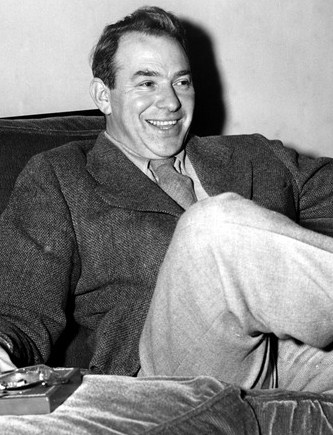Yip Harburg (Edgar Yipsel Isidore Hochberg)

Yip Harburg, the youngest of four surviving children (out of ten), was born Isidore Hochberg on the Lower East Side of New York City on April 8, 1896. His parents, Lewis Hochberg and Mary Ricing, were Yiddish-speaking Orthodox Jews who had emigrated from Russia. Isidore later adopted the name Edgar Harburg, and came to be best known as Edgar “Yip” Harburg. He attended Townsend Harris High School, where he and Ira Gershwin, who met over a shared fondness for Gilbert and Sullivan, worked on the school paper and became lifelong friends. According to his son Ernie Harburg, Gilbert, and Irish dramatist George Bernard Shaw taught his father, a “democratic socialist, [and] sworn challenger of all tyranny against the people, that ‘humor is an act of courage’ and dissent”. After World War I, Harburg returned to New York, and graduated from City College (later part of the City University of New York), which Ira Gershwin had initially attended with him, in 1921. After Harburg married and had two children, he started writing light verse for local newspapers. He became a co-owner of Consolidated Electrical Appliance Company, but the company went bankrupt following the crash of 1929, leaving Yip Harburg “anywhere from $50,000 – $70,000 in debt,” which he insisted on paying back over the course of the next few decades. At this point, Harburg and Ira Gershwin agreed that “Yip” should start writing song lyrics. Gershwin introduced Harburg to Jay Gorney, who collaborated with him on songs for an Earl Carroll Broadway review (Earl Carroll’s Sketchbook): the show was successful and Harburg was engaged as lyricist for a series of successful revues, including Americana in 1932, for which he wrote the lyrics of “Brother, Can You Spare a Dime?” to the tune of a lullaby Gorney had learned as a child in Russia. This song swept the nation, becoming an anthem of the Great Depression.
Yip Harburg and Gorney were offered a contract with Paramount: in Hollywood, Harburg worked with composers Harold Arlen, Vernon Duke, Jerome Kern, Jule Styne, and Burton Lane, and later wrote the lyrics for The Wizard of Oz, one of the earliest known “integrated musicals,” for which he won the Academy Award for Best Music, Original Song for “Over the Rainbow.” Working in Hollywood did not stop Harburg’s career on Broadway. In the 1940s, he wrote a series of “book” musicals with social messages, including the successful Bloomer Girl (1944), set during the Civil War, which was about temperance and women’s rights activist Amelia Bloomer. Harburg’s best known Broadway show, Finian’s Rainbow (1947) was, in its original production, possibly the first Broadway musical with a racially integrated chorus line, and features his “When the Idle Poor Become the Idle Rich.” It was made into a film in 1968 starring Fred Astaire and Petula Clark, directed by Francis Ford Coppola. Although never a member of the Communist Party[9] (he was a member of the Socialist Party, and joked that “Yip” referred to the Young People’s Socialist League, nicknamed the “Yipsels”) he had been involved in radical groups, and he was blacklisted. Harburg was named in a pamphlet “Red Channels: The Report of Communist Influence in Radio and Television;” his involvement with the Hollywood Democratic Committee, and his refusal to identify reputed communists, led to him being blocked from working in Hollywood films, television, and radio for twelve full years, from 1950 to 1962. “As the writer of the lyric of the song ‘God’s Country,’ I am outraged by the suggestion that somehow I am connected with, believe in, or am sympathetic with Communist or totalitarian philosophy,” he wrote to the House Un-American Activities Committee in 1950. Harburg was unable to travel abroad during this period, as his passport had been revoked. With a score by Sammy Fain and Harburg’s lyrics, the musical Flahooley (1951) satirized the witch-hunt’s hysterically anti-communist sentiment, but it closed after 40 performances at the Broadhurst Theatre on Broadway. The New York critics were dismissive of the show, although it had been a success during its earlier pre-Broadway run in Philadelphia.
In 1966, songwriter Earl Robinson sought Harburg’s help for the song “Hurry Sundown”; the two collaborated on the song and are credited as co-writers. The song was intended for the film Hurry Sundown, but was not used in the film. It was, however, recorded by Peter, Paul and Mary for their 1966 album The Peter, Paul and Mary Album. The song was released as a single in 1967, and reached #37 on the Billboard Easy Listening chart. It was also nominated for the Grammy Award for Best Folk Recording. Harburg was initially reported to have died in a traffic accident. His death was actually due to a heart attack, sustained while his car was stopped at a traffic light on Sunset Boulevard in Hollywood on March 5, 1981.
Born
- April, 08, 1896
- USA
- Manhattan, New York
Died
- March, 05, 1981
- USA
- Hollywood, California
Cause of Death
- heart attack
Other
- Cremated


